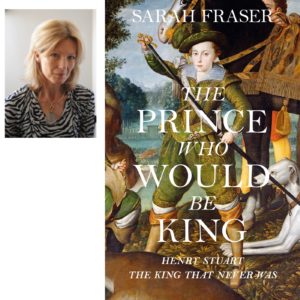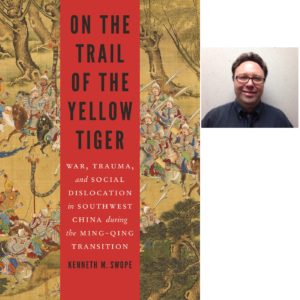Podcast: Play in new window | Download
Subscribe: RSS
Check out this book here https://amzn.to/3aHc7KV
Sarah Fraser has written The Last Highlander and The Prince Who Would Be King. She holds a PhD in English Literature and also earned a degree in History where she focused on Celtic history in Scotland.
2:35 – Ms. Fraser enjoys history because it can be used a lens in which to view the present. She is also very drawn to the time period she wrote about and the people who inhabited that time period. The stakes were life and death and the survival of nations.
3:16 – Her first degree was a PhD in English Literature and then she moved into History when her children were getting a Gaelic education. She became interested in Celtic history in Scotland.
4:06 – Her first book about her husband’s ancestor, an old Highland chief.
4:38 – The book is a stepping is a stepping stone between Elizabeth I and James VI and I. Elizabeth was the last of the medieval rulers and James presided over a period of huge change. Henry is James’ oldest son.
6:50 – This period was the English period of religious of turmoil. It was a period of religious warfare. There’s a century in Europe when people fought over religion. Faith was something they lived or died for.
8:36 – The Guy Fawkes plot was of awesome ambition to destroy the English government and make Britain a group of Catholic puppet states of Spain. Henry was a target of the plot as much as James was. Protestants feared the popery.
10:51 – The plot made Henry feel that war was coming to England. Henry always cared about military affairs and this intensified the feeling. He was tutored by men who had fought in previous religious wars.
13:37 – From the moment the Renaissance hits, royal children begin being taught in a Renaissance way. Erasmus developed the education of the Christian prince. He influenced both Spain and England.
15:21 – Henry would wear Tudor colors to prove that he is the proper person to fill the Tudor throne. He wore symbols depicting being a Christian solder whereas his father was more about peace and learning.
17:21 – Denmark was wealthy and had the best Navy. Christian IV of Denmark was Henry’s uncle and he gave Henry an impressive warship, the Vice-Admiral.
19:59 – The Royal Navy is decrepit at this time and the Royal shipyards are very corrupt. Walter Raleigh complained about English ships at this time. Henry wants to fix that. He was also learning military affairs from the famous Maurice of Nassau. Maurice dedicated his book to Henry.
22:11 – Henry is not so much anti-Catholic as he is pro-Protestant. Henry’s tutors are more puritan, they’re militant and they’re internationalist. They see an international brotherhood of Protestants. Spain had started suffering from overreach by the end of the 1500s but are becoming more militant about Catholicism. Many of Henry’s allies fear Spain. Both the Catholics and Protestants had international leagues.
24:53 – Henry was focused on founding a new Jerusalem in North America. A purely Protestant country. A lot of the people around Henry were at the godly end of Protestantism and were very political.
28:04 – The Mayflower Puritans left England because James I didn’t like them. They wouldn’t recognize him as the head of the Church on Earth. Charles dislikes them even more when he takes the throne.
30:11 – Henry was the patron of the Virginia Company. Henry wanted to control the seas and exploit North America for the Protestants. Spain was angry at this plan.
31:31 – Henry had to deal with massive royal debts. He wanted to work with Parliament to solve his problems. He wanted to be made Prince of Wales in Parliament so that everyone in London and in power would see him as king. He also begins collecting artwork with spiritual value, coins, italios, suits of armor, statues, etc. at a massive scale.
35:25 – The military wing of England gathers at Henry’s court since James isn’t as interested in military matters. Some of those who gather around him later join the Parliament during the English Civil War.
37:30 – Ms. Fraser used both primary and secondary sources. She went to the British Library, the Royal Archives, the National Library of Scotland and so on to find the letters and drafts from that period. The British Library also has the first map made of the Chesapeake Bay area. It was made in 1607 by Henry’s gunner. The expedition founded Henrico in Virginia. Henrico College was also named after Henry and was supposed to convert indigenous people.
41:03 – Henry’s letters haven’t been consulted much because he didn’t become king. He wrote formal letters in Latin and then many daily quick notes to people written in English or French.
43:14 – Henry’s effigy was the most interesting artifact Ms. Fraser came across. It was very elaborate and realistic. It was on his bier and was ravaged by souvenir hunters during the months after his death. People thronged to his funeral and there was an enormous amount of sorrow.
45:36 – Ms. Fraser loved bringing Henry back to life with the letters. But some events she knows happened but you can’t find Henry talking about it. Other letters refer to his actions.
48:05 – Henry and his friends grew up quickly. Henry was attending to diplomats at the age of ten. He and his friends were thinking of going to war when they were young. For Henry, he went from being a child to an adult at age 13. His household became a collegiate court.
50:32 – His sister Elizabeth became known as the Winter Queen, Elizabeth of Bohemia. She and her husband kicked off the Thirty Years’ War. Charles and Elizabeth was tutored too but not as intensely as Henry. Charles was part of Henry’s military salon at the court.
52:28 – The whole book was difficult because Henry didn’t become king. Ms. Fraser had to create a James Dean moment for Henry. The end of the golden boy moved Ms. Fraser. Writing his death was very difficult. Ms. Fraser was heartbroken for Henry.
55:21 – Henry had the biggest state funeral for a while. It was bigger than Elizabeth’s. His parents didn’t attend because of grief. His bier had his pennants and mottos. He had eight black warhorses and the one motto was “He Delights to go upon the Deep,” from his father. The other motto was “Glory is the Torch of the Upright Mind.” The third was “It is Right to Seek for Other Countries.”
57:16 – Ms. Fraser would like to put Henry back into history. She also wants to highlight the slow rise of militant Puritanism.
58:23 – Ms. Fraser wanted to write about James VI and I but HarperCollins said they had a book on him and wanted one on Henry so she did that. She is now working on Jacobite fiction.
59:38 – Shakespeare was a part of Henry’s household with the King’s Players. They were ushers at the tables went not doing plays. Shakespeare learned a lot about kings and courts from this work. Ben Johnson wrote during this period too.
1:01:25 – King Lear is about a king who’s done with ruling and goes off hunting. This is just what James VI and I did too. Shakespeare wrote King Lear almost saying to the king to not leave the court and the country. But works were censored so contentious pieces were set in Ancient Rome to circumvent censorship issues. Englishmen at this time are discussing civil liberties and opposing tyranny.
1:05:20 – Ben Johnson worked for Henry a lot but Shakespeare didn’t work for Henry.
1:05:40 – The Last Highlander has been out a while. The biography Ms. Fraser wrote is about the real grandfather of the fictional hero Jamie Fraser in the Outlander series. Her website is Sarahfraser.co.uk. She’s also on twitter at @Sarah_FraserUK.
Links
https://en.wikipedia.org/wiki/Outlander_(TV_series)
https://www.sarahfraser.co.uk/
For more “Military History Inside Out” please follow me on Facebook at warscholar, on twitter at Warscholar, on youtube at warscholar1945 and on Instagram @crisalvarezswarscholar
Guests: Sarah Fraser
Host: Cris Alvarez
Tags: Stuart, Tudor, Prince of Wales, Catholic, Protestant, Puritan, Erasmus, Thirty Years War, James, Charles, james VI, Winter Queen, Bohemia, Denmark, Sterling castle, Henrico, Chesapeake bay, Virginia, Spain, Britain, England, Scotland, Royal Navy, Royal shipyard, Walter Raleigh, Guy Fawkes, Gunpowder Plot, Calvinist, Henry
Check out this book here https://amzn.to/3aHc7KV
As an Amazon Associate I earn from qualifying purchases.


